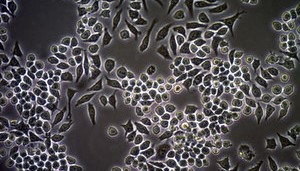Immortalized Murine Cells
 Murine cells show frequent spontaneous immortalization in contrast to human cells that almost never spontaneously immortalize. Addition of DNA tumor viruses alone, mild mutagen treatments and even deregulated expression of cellular genes such as c-myc are enough in certain murine cells for immortalization. Crisis stage is either not observed or is very subtle in case of murine cells, due to their ability to immortalize spontaneously, were exploited to identify genes associated with cellular mortal or immortal phenotypes. Independent studies on spontaneously immortalized clones from different strains of mouse have shown that most of these clones had one or both mutant p53 alleles, in contrast to their parent cells which expressed wild type p53. The immortal clones which expressed wild type p53 were found to be defective in one or other elements of the pRb pathway.
Creative Bioarray can provide you immortalized murine cell lines with an integrated platform for meeting the needs for virtually any relevant research project.
Murine cells show frequent spontaneous immortalization in contrast to human cells that almost never spontaneously immortalize. Addition of DNA tumor viruses alone, mild mutagen treatments and even deregulated expression of cellular genes such as c-myc are enough in certain murine cells for immortalization. Crisis stage is either not observed or is very subtle in case of murine cells, due to their ability to immortalize spontaneously, were exploited to identify genes associated with cellular mortal or immortal phenotypes. Independent studies on spontaneously immortalized clones from different strains of mouse have shown that most of these clones had one or both mutant p53 alleles, in contrast to their parent cells which expressed wild type p53. The immortal clones which expressed wild type p53 were found to be defective in one or other elements of the pRb pathway.
Creative Bioarray can provide you immortalized murine cell lines with an integrated platform for meeting the needs for virtually any relevant research project.
Description: Immortalized Rat Primary Vein Endothelial Cells-SV40 provided by Creative Bioarray have been ...
Description: Immortalized Rat Primary Vein Fibroblasts-SV40 provided by Creative Bioarray have been developed by ...
Description: Immortalized Rat Primary Vein Smooth Muscle Cells-SV40 provided by Creative Bioarray have been ...
Description: The CFSC-8B cell line is an immortalized hepatic stellate cell line derived from the liver of a rat ...
Description: The HSC-T6 cell line is a well-established immortalized model derived from adult rat liver, widely ...
Description: Derived from normal rat liver tissue, the BRL-3A cell line is a robust and continuous ...
Description: Follicle stimulating hormone (FSH) receptor, a receptor uniquely expressed in ovarian granulosa and ...
Description: The Immortalized Mouse Retinal Pigmented Epithelial Cells- HPV E6/E7, derived from healthy C57B1/6 ...
Description: The Immortalized Rat Conjunctival Epithelial Cells (CJ4.1A) were derived from primary conjunctival ...
Description: Hepatic sinusoidal endothelial cells (HSECs) are an unique sub-population of liver that lines the ...